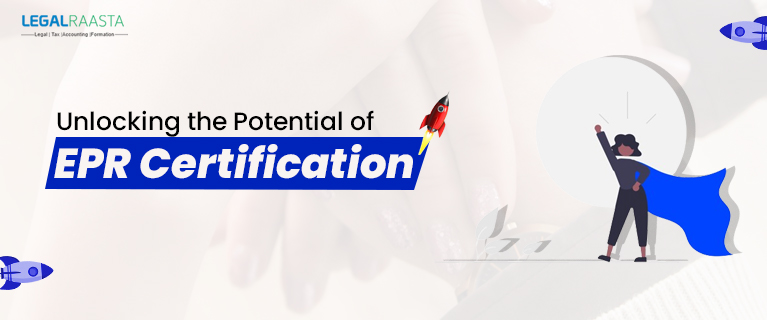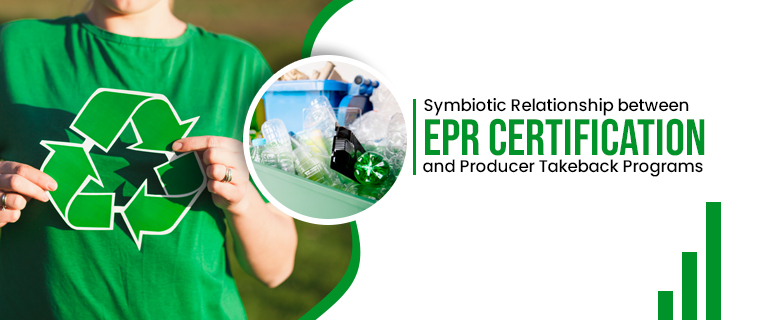Unlocking the Potential of EPR Certification
In today's world, where environmental sustainability is a pressing concern, Extended Producer Responsibility (EPR) certification has emerged as a vital tool for businesses to demonstrate their commitment to responsible waste management. EPR programs aim to shift the responsibility of managing end-of-life products from local governments to producers, thereby encouraging sustainable practices throughout the product lifecycle. However, obtaining EPR certification entails meeting specific requirements that ensure compliance with environmental regulations and best practices. Let's delve into the essential requirements of EPR certification and explore why it's crucial for businesses to embrace this initiative.
Understanding EPR Certification:
Before delving into the requirements, it's essential to grasp the concept of EPR certification. EPR is a policy approach that holds manufacturers, importers, and retailers accountable for the entire lifecycle of their products, including disposal and recycling. EPR certification verifies that a company has implemented effective systems for managing its products responsibly, thereby minimizing their environmental impact.
Read also this-: The Cost of EPR Certification in IndiaKey Requirements for EPR Certification:
1. Legal Compliance:
One of the primary requirements for EPR certification is compliance with relevant environmental laws and regulations. This includes adhering to waste management regulations, recycling targets, and reporting obligations set forth by governing bodies.
2. Product Stewardship Plan:
A comprehensive product stewardship plan is essential for EPR certification. This plan outlines how a company will manage its products from manufacturing to end-of-life disposal, including collection, recycling, and disposal methods.
3. Financial Responsibility:
EPR programs often require companies to demonstrate financial responsibility for managing their products' end-of-life phase. This may involve setting aside funds for recycling and disposal or participating in producer-financed recycling schemes.
4. Transparency and Reporting:
Transparency is critical in EPR certification. Companies must provide accurate and detailed reporting on their product lifecycle management practices, including collection rates, recycling rates, and environmental impact assessments.
5. Continuous Improvement:
EPR certification is not a one-time achievement but an ongoing commitment to sustainability. Companies seeking certification must demonstrate a commitment to continuous improvement by implementing measures to reduce waste generation, increase recycling rates, and minimize environmental impact.
6. Stakeholder Engagement:
Engaging with stakeholders, including consumers, government agencies, and environmental organizations, is another essential requirement for EPR certification. Companies must demonstrate that they actively seek feedback and collaborate with stakeholders to improve their environmental performance.
7. Supply Chain Management:
Effective supply chain management is crucial for EPR certification. Companies must ensure that their suppliers adhere to environmental standards and share their commitment to sustainable practices to mitigate the environmental impact of their products' lifecycle.
8. Auditing and Verification:
Independent auditing and verification are integral parts of the EPR certification process. Companies must undergo regular audits conducted by accredited third-party organizations to verify their compliance with EPR requirements and environmental standards.
The Importance of EPR Certification:
EPR certification offers several benefits for businesses, consumers, and the environment:
1. Environmental Protection:
By holding producers accountable for their products' entire lifecycle, EPR certification helps reduce waste generation, promote recycling, and minimize environmental pollution.
2. Resource Conservation:
EPR encourages resource conservation by promoting the reuse, recycling, and recovery of materials from end-of-life products, thereby reducing the need for virgin resources.
3. Corporate Responsibility:
EPR certification demonstrates a company's commitment to corporate social responsibility and environmental stewardship, enhancing its reputation and brand value in the eyes of consumers and stakeholders.
Read also this-: Revolutionizing E-Waste Management Through EPR Certification4. Cost Savings:
Implementing efficient product lifecycle management practices through EPR certification can lead to cost savings for businesses by optimizing resource utilization and minimizing waste disposal expenses.
5. Legal Compliance:
EPR certification helps companies ensure compliance with environmental regulations and avoid potential fines or penalties associated with non-compliance.
Conclusion:
In conclusion, EPR certification is a valuable tool for businesses seeking to demonstrate their commitment to environmental sustainability and responsible waste management. By meeting the requirements outlined above, companies can not only minimize their environmental impact but also enhance their reputation, reduce costs, and contribute to a more sustainable future. Embracing EPR certification is not only a legal obligation but also a strategic imperative for businesses looking to thrive in an increasingly eco-conscious marketplace.




Comments
Post a Comment